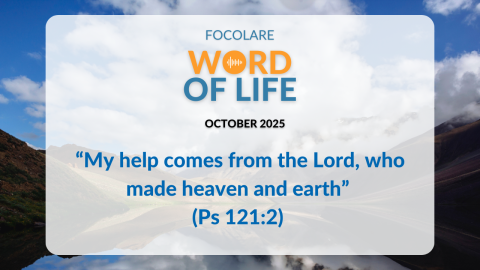By Patrizia Mazzola and the Focolare Word of Life team
The verse for this month’s Word of Life is taken from the book of Genesis. The words are spoken by Hagar, Sarah’s slave who was given in marriage to Abraham because Sarah could not bear children and ensure offspring.
When Hagar discovers she is pregnant, she feels superior to her mistress. The mistreatment she then receives from Sarah eventually forces her to flee into the desert.
There she has a unique encounter with God and receives the promise of offspring in a way that is similar to the pledge made by God to Abraham. The son to be born will be called Ishmael, which means “God has heard.” God takes Hagar’s anguish upon himself and gives her a lineage.
“You are the God who sees me.”
Hagar’s reaction reflects the belief commonly held in the ancient world that human beings could not sustain close contact with the divine. Hagar was surprised and grateful to have survived what had taken place. She felt God’s love in the desert, the privileged place where we can experience a personal encounter with him.
Hagar was aware of his presence and felt loved by a God who had “seen” her in her painful situation, a God who cares for and surrounds his sons and daughters with love.
“He is not an absent, distant God, indifferent to the fate of humanity or to the fate of each one of us,” wrote Focolare founder Chiara Lubich in a Gospel commentary in 2006. “So many times we experience this. He is here with me, he is always with me, he knows everything about me and shares my every thought, every joy, every desire. He bears with me all my trials and worries.”
“You are the God who sees me.”
This Word of Life revives certainty and gives us comfort. We are never alone in our journey through life, because God is there and loves us.
Sometimes, like Hagar, we feel like strangers on this earth, or we look for ways to escape from challenging and painful situations. But we must be certain of God’s presence and our relationship with him. He sets us free, reassures us and always allows us to start again.
This was P.’s experience of living alone during the pandemic. “Since the start of the total lockdown of all activity in our country, I have been alone in my home. There is no one with whom I can have physical contact or who can share this experience with me. So I try to fill the day as best I can.
“As time goes by, however, I feel more and more discouraged, and I find it very hard to fall asleep at night. Sometimes I feel as if I will never escape from this nightmare.
“However, I feel strongly that I must rely completely on God and believe in his love. I have no doubts about his presence: I am certain that he accompanies and comforts me during these lonely months.
“I realize that I am not alone because of the little signs that come to me from my neighbors. An example was the time when I was celebrating a friend’s birthday online, and immediately afterwards, my neighbor left a slice of cake by my door.”
“You are the God who sees me.”
We too can be messengers of God’s love, because we are held safe in his presence. Indeed, we are called to see the needs of others, help our neighbors when they feel they are “alone in the desert,” and share their joys and sorrows.
We are frequently absorbed in personal matters and an effort is needed on our part to recognize the needs of humanity around us.
We can stop and draw close to those who are searching for meaning and answers to life’s many questions. They may be friends, family, acquaintances, neighbors, colleagues, people in financial difficulty or perhaps people who are socially marginalized.
We can remember and share with others those precious moments in which we encountered God’s love and rediscovered the meaning of our lives.
We can face difficulties together, and when we feel we must “cross the desert,” we can discover the presence of God in what is happening around us. This gives us confidence to continue our journey.





